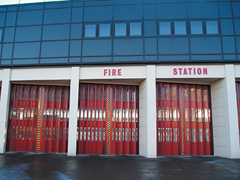Call for change in Fire and Rescue Service
 After heavy criticism, the Fire and Rescue Service has pledged to improve its governance. Assembly members will be following progress closely.
After heavy criticism, the Fire and Rescue Service has pledged to improve its governance. Assembly members will be following progress closely.
Fundamental change at the Northern Ireland Fire and Rescue Service (NIFRS) headquarters is “a matter of absolute urgency,” Health Minister Edwin Poots has told the Assembly after three critical reports into the service’s performance. The Minister has called for all existing grievances and complaints to be “drawn to a conclusion as soon as possible” and for all NIFRS employees to “get behind their management team and work with them to move this organisation forward.”
The report into alleged financial irregularities substantiated the allegations of unapproved bonus payments (amounting to £15,200) and an incorrect fraud return to the Department of Finance and Personnel. Several other allegations were largely or partially substantiated although the alleged conflicts in a media services contract were unsubstantiated.
Key recommendations included a “formal and comprehensive” cultural change management strategy, prompt and transparent reporting of all allegations of suspected irregularity and fraud to the Department of Finance and Personnel, and a review of human resources procedures.
All offers of sponsorship should be notified to the department and the Fire and Rescue Service Board. An Assistant Chief Fire Officer had received unapproved sponsorship in the form of a Land Rover and had not returned this to the supplier, despite a warning that it could be “misconstrued as a bribe”. The supplier was applying for, and was subsequently awarded, the service’s replacement tyre contract. The officer, Peter Craig, was appointed as Chief Fire Officer but has since retired. Peter Craig has not been subject to disciplinary action. The service is seeking advice on whether disciplinary action can be taken against retired staff.
Separately, investigators found that a former stores manager, now deceased, had sold protective clothing to other organisations through his own company. The investigation could not find evidence that the business affected his work in the Fire and Rescue Service. The manager, though, had not signed a conflict of interest form and it was therefore recommended that all staff complete such a statement on an annual basis.
“Any links to outside businesses, particularly those with NIFRS contracts, should be identified,” the report stated, and management should review those statements to determine whether conflicts of interest exist. Stock-taking exercises should be undertaken at the end of the financial year and half-way through the financial year.
In a third investigation, a 2011 recruitment exercise for fire-fighters was reviewed by the UK Government’s Chief Fire Adviser, Sir Ken Knight, and officials from London Fire Brigade. The investigators found “no direct evidence of nepotism” but were not content that personal interests had been clearly separated from decision-making. The service also had no written overtime policy and the Minister wants these “significant weaknesses … put right at the earliest possible moment.”
A new investigation has subsequently been announced into the potential fraud and theft of wood from the service’s training yard. The BBC understands that chipboard may have been used for heating and laying floors in several Orange halls.
Fire and Rescue Service Chief Executive Jim Wallace welcomed the department’s reports and fully accepted that mistakes had been made in the past.
“Reassuringly, many of the recommendations reflect what we are already doing and our current practices,” he commented. “We are setting a new tone for the organisation and a new pace for change and improvement. The process of reform has already started and we are developing an organisational reform plan, essentially a new way forward for NIFRS, which will address the issues raised in the reports that we have inherited.”
Giving evidence to the Health, Social Services and Public Safety Committee on 28 November, Edwin Poots said that he had “major expectations and confidence” that the new Chief Executive “will be able to address the corporate failings and make the improvements necessary.”
Wallace made clear that the investigation did not reflect on the front-line work of fire-fighters, and the public “can and should remain confident” in their Fire and Rescue Service. The Minister has affirmed that “we can be immensely proud of the service that NIFRS provides to the public” and fire-fighters “deserve to be supported and praised.”





